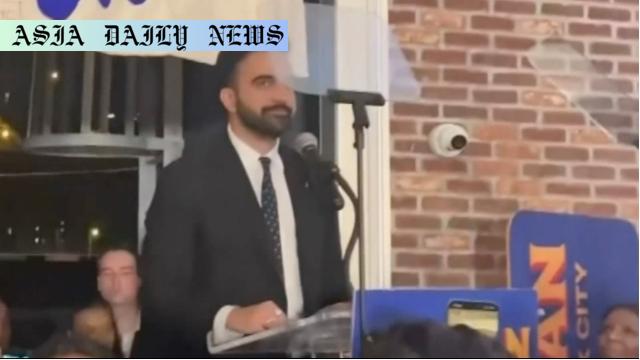Zohran Mamdani declared victory in the New York City Democratic primary, defeating Andrew Cuomo in a stunning upset.
- Zohran Mamdani won the Democratic primary for NYC mayor.
- Defeated Andrew Cuomo in a surprising electoral upset.
- Mamdani pledges policies benefiting immigrants and youth.
- Tax increases for the wealthy stoke debates across parties.
- Donald Trump reacts, calling Mamdani a ‘communist’.

Zohran Mamdani’s Path to Historic Victory
In a turn that has surprised political analysts and energized progressive Democrats nationwide, Zohran Mamdani, a 33-year-old Indian-American Muslim, has secured the Democratic nomination for New York City’s mayoral race. His victory, described by observers as a ‘stunning upset,’ marks a historic moment in New York politics. Mamdani, a member of the New York State Assembly, defeated seasoned political heavyweight Andrew Cuomo, the former New York State governor, who was widely considered the frontrunner in this race.
Backed by a strong coalition of young voters, immigrants, and progressive Democrats, Mamdani’s campaign focused on transformative policies such as free public childcare, free bus services, and increasing access to affordable housing. This vision, coupled with endorsements from influential figures like Representative Alexandria Ocasio-Cortez, propelled Mamdani to an unlikely victory that has redefined the city’s political landscape. His candidacy is notable not only for his platform but also for the representation he brings to a city as diverse as New York, reflecting the values and hopes of underrepresented communities.
The Policy Proposals That Shaped His Success
Central to Mamdani’s success has been his clear stance on issues that resonate with New Yorkers facing day-to-day challenges. His proposed initiatives to build more public housing and his pledge to champion free childcare aim to address two of the city’s most pressing concerns: housing affordability and family support. These ideas have garnered support from younger voters, who prioritize equity and sustainability, making them a crucial demographic in this election.
However, his plans have not been without controversy. Mamdani’s proposal to raise taxes on wealthy individuals and large corporations has drawn criticism from conservative and moderate circles alike. While his supporters see this as a step to redistribute wealth and fund essential public services, detractors warn of potential economic fallout that could deter business investments and exacerbate economic inequality. New York City’s financial leaders, including a segment of the Democratic establishment, are likely to contest these proposals in the weeks leading up to the mayoral election.
A Divided Political Landscape
Mamdani’s victory has also sparked reactions from notable figures. President Donald Trump, using his social media platform, criticized Mamdani, labeling him a ‘communist’ and asserting that this result reflects a broader ideological shift within the Democratic Party. Meanwhile, former Governor Andrew Cuomo suggested he might run as an independent, a move poised to further fragment the political landscape. Incumbent Mayor Eric Adams is also expected to seek a second term as an independent candidate, adding complexity to an already competitive race.
As debate intensifies over policies and political ideologies, the upcoming election is shaping up to be a critical moment not just for New York City but also for nationwide conversations around governance, representation, and political priorities. If Mamdani is elected mayor, his tenure is likely to signal a shift toward progressive governance with far-reaching implications.



Commentary
Zohran Mamdani’s Win Reflects Shifting Dynamics
Zohran Mamdani’s victory in the Democratic primary sends a powerful message about the changing dynamics of American politics. This triumph is not merely about his policies; it is a statement about representation and the growing demand for transformational leadership in an era of inequality and social challenges. As a young candidate representing diverse communities, Mamdani has captured the imagination of voters who feel disillusioned by traditional politics.
His policies, which prioritize public welfare over corporate interests, resonate with many New Yorkers who believe the city has grown increasingly unaffordable and exclusionary. By addressing fundamental issues—like affordable housing and public transportation—Mamdani has built a campaign tailored to the everyday struggles of New Yorkers. Yet such bold proposals, particularly his controversial tax plans, raise valid questions about economic viability. Will the wealthy leave the city? Will businesses relocate, reducing the tax base? These are questions Mamdani must address if elected as mayor.
Despite the critiques, this victory underscores the desire for change. The political establishment must now reckon with the rise of progressivism and its ability to mobilize grassroots support. Mamdani left no doubt that he intends to govern for those historically left behind. Whether his idealism can translate into effective governance remains to be seen, but his campaign has already shifted the conversation, challenging the notion that politics as usual is acceptable.